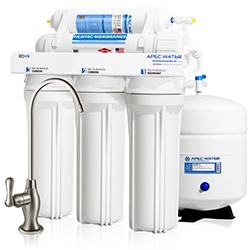Look if the world falls apart, like the survivalists predict. Civilization falls and the barbarians are at the gates. By all means drink any water you can get your hands on. But for day to day useage right now I would not. If you are seriously harvesting rainwater and recycling water your useage would be so low that sipping from the public water supply would be minimal. One of the problems is we so heavily pollute the air that you could never be sure that you were harvesting minute amounts of things like lead and mercury.
But if you must:
:}
http://www.freedrinkingwater.com/water-education2/9-cistern-water.htm
CISTERN WATER
In some areas there are attempts to collect rainwater in cisterns. In general, these cistern waters are harder and contain more total solids than rain. This is due to the accumulation of dirt and dust on the surface of the cisterns. One study shows that in 500 household cisterns, hardness ranged from 35 to 150 ppm. Further, cistern waters often have a high bacterial count and noticeable color. While in many cases the organisms found in cisterns are nonpathogenic, it is advisable to chlorinate this water where it is used for drinking purposes.
According to recent news and reports, most tap and well water in the U.S. are not safe for drinking due to heavy industrial and environmental pollution. Toxic bacteria, chemicals and heavy metals routinely penetrate and pollute our natural water sources making people sick while exposing them to long term health consequences such as liver damage, cancer and other serious conditions. We have reached the point where all sources of our drinking water, including municipal water systems, wells, lakes, rivers, and even glaciers, contain some level of contamination. Even some brands of bottled water have been found to contain high levels of contaminants in addition to plastics chemical leaching from the bottle.
A good water filtration system installed in your home is the only way to proactively monitor and ensure the quality and safety of your drinking water. Reverse osmosis water purification systems can remove 90-99% of all contaminants from city and well water to deliver healthy drinking water for you and your family.

Healthy and Convenient! Our Featured Reverse Osmosis Drinking Water System
:}
Indeed some claim that it could be real dangerous. If you have a weak stomach quit reading:
http://jeq.scijournals.org/cgi/content/abstract/13/1/38
Atmospheric Deposition and Roof-Catchment Cistern Water Quality1
The water quality in 40 roof-catchment cistern systems in rural Clarion and Indiana Counties, Pa. was studied to determine the impact of atmospheric deposition. Roof-catchment cisterns are open to atmospheric contaminants such as the toxic metals Pb and Cd, and corrosive acid components present in acid precipitation.
Bulk precipitation samples failed to meet the drinking water standard for Pb on several occasions and were consistently quite corrosive. Mean Pb, Cd, and Cu concentrations were well below drinking water limits for all cistern water samples. Cistern water was corrosive in all but a few cases, as indicated by the Langelier saturation index, although not as corrosive as the bulk precipitation due to the dissolution of CaCO3 from cistern walls and floors. Vinyl-lined cisterns contained water nearly as corrosive as the incoming precipitation.
Seventy percent of the systems on one or more occasions exhibited cistern bottom sediment/water Pb or Cd concentrations that exceeded the drinking water limits. This indicated that metals deposited on roof catchments were accumulating at the bottom of the cisterns. Standing tap water samples exhibited high Pb and Cu concentrations. Nine of the forty systems studied produced standing tap water Pb concentrations that averaged above the drinking water standard. The mean Pb, Cd, and Cu concentrations of running tap water samples all fell below the drinking water standards. Atmospheric deposition of Pb and its infusion into tap water as a corrosion product pose a significant health threat to users of roof-catchment cistern systems in western Pennsylvania.
:}
On the other hand after proper filtration and clorination these folks seem to think its OK. But I let you read it for yourself:
http://www.inspect-ny.com/water/WaterCisterns.htm
:}

Pingback: Ultraviolet Water Purification